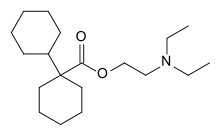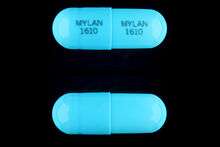Dicycloverine
 | |
| Clinical data | |
|---|---|
| Trade names | Byclomine, Bentyl, Dibent, Di-Spaz, Dilomine |
| AHFS/Drugs.com | International Drug Names |
| MedlinePlus | a684007 |
| Pregnancy category | |
| ATC code | |
| Legal status | |
| Legal status | |
| Pharmacokinetic data | |
| Protein binding | >99% |
| Elimination half-life | 5 h |
| Identifiers | |
| |
| CAS Number | |
| PubChem CID | |
| IUPHAR/BPS | |
| DrugBank | |
| ChemSpider | |
| UNII | |
| KEGG | |
| ChEBI | |
| ChEMBL | |
| ECHA InfoCard |
100.000.919 |
| Chemical and physical data | |
| Formula | C19H35NO2 |
| Molar mass | 309.49 g·mol−1 |
| 3D model (JSmol) | |
| |
| |
| (verify) | |
Dicycloverine, also known as dicyclomine, is a prescription medication that relieves muscle spasms in the gastrointestinal tract through an apparent mechanism of nonselective smooth muscle relaxation, and that presents a range of anticholinergic side effects. It was first synthesized in the United States around 1945.
Medical uses
Dicyclomine is used to treat the symptoms of irritable bowel syndrome, specifically hypermotility, in adults.[1][2] As of 2016 clinical guidelines recommended dicycloverine and other antispasmodics for IBS with diarrhea as a first line treatment, the evidence for their effectiveness was very weak.[1]
Contraindications
It should not be used for people who have an obstructive GI or urinary condition, severe ulcerative colitis, reflux, any unstable cardiac condition, glaucoma, myasthenia gravis, and anyone who is acutely bleeding.[2]
It should not be used in children or infants with colic due to the risks of convulsions, difficult breathing, irritability, and restlessness,[3] and there is little evidence to support the efficacy in such use in any case.[4]
Because dicycloverine is known to impair thinking and coordination, people taking the drug should avoid driving or operating machinery.[2]
The effect on a fetus or on a breastfeeding child is not well understood.[2]
Adverse effects
Dicycloverine can cause a range of anticholinergic side effects such as dry mouth, nausea, blurred vision, dizziness, confusion, severe constipation, stomach pain, heart palpitations, difficulty urinating, and seizures.[1]
Pharmacology
Dicycloverine blocks the action of acetylcholine on cholinergic receptors on smooth muscles in the GI tract, relaxing the smooth muscle.[1]
History

Dicycloverine was first synthesized chemically in the United States circa 1945 by scientists at William S. Merrell Company.[5]
It was first marketed in 1952 for gastrointestinal disorders, including colic in infants.[3] The INN name "dicycloverine" was recommended in 1959.[6] It was included in the combination drug for morning sickness called Bendectin, along with doxylamine and vitamin B6 which was launched in the US 1956; dicyclomine was removed from the formulation in 1976 after Merrell determined that it added no value. Bendectin became the subject of many lawsuits due to allegations that it had caused birth defects similar to thalidomide, which Merrell had also marketed in the US and Canada.[7]:317
In the mid 1980's several governments restricted its use in infants due to reports of convulsions, difficult breathing, irritability, and restlessness in infants given the drug.[3]
In 1994 the US Federal Trade Commission ordered Marion Merrell Dow, which had recently acquired Rugby Darby, the only generic manufacturer of dicycloverine in the US, to promise to grant licenses to its intellectual property on the drug to any company that wanted it, based on antitrust concerns. The US market for the drug at that time was around $8 million; Dow had 60% of it and Rugby had 40%. The next year, Hoechst Marion Roussel, which by that time had acquired the business, granted a license to Endo Pharmaceuticals. By 2000 several other generic competitors had started selling the drug. The case was part of the reshaping of the US pharmaceutical market that occurred in the 1990s, to favor generic entry.[8]
Society and culture
There are reports of dicycloverine abuse, but they are rare.[1]
References
- 1 2 3 4 5 Canadian Agency for Drugs and Technologies in Health (3 December 2015). "Dicyclomine for Gastrointestinal Conditions: A Review of the Clinical Effectiveness, Safety, and Guidelines". CADTH Rapid Response Reports. PMID 26985553.

- 1 2 3 4 AHFS Staff (2006). "Dicyclomine hydrochloride". AHFS DI Essentials. Bethesda, MD: American Society of Health-System Pharmacists / drugs.com. Retrieved November 12, 2016.
- 1 2 3 Consolidated List of Products Whose Consumption and/or Sale Have Been Banned, Withdrawn, Severely Restricted or Not Approved by Governments, Twelfth Issue - Pharmaceuticals. World Health Organization. 2005. p. 106.
- ↑ Biagioli E, Tarasco V, Lingua C, Moja L, Savino F (September 2016). "Pain-relieving agents for infantile colic". The Cochrane Database of Systematic Reviews. 9: CD009999. doi:10.1002/14651858.CD009999.pub2. hdl:2434/444531. PMID 27631535.

- ↑ "Dicyclomine". Pubchem. Retrieved 20 August 2018.
- ↑ "International Nonproprietary Names for Pharmaceutical Preparations List #3" (PDF). WHO Chronicle. 13 (12): 463–474. December 1959.
- ↑ Sanders J (January 1992). "The Bendectin Litigation: A Case Study in the Life Cycle of Mass Torts". Hastings Law Journal. 43 (2): 301–418.
- ↑ Chien C (2003). "Cheap Drugs at What Price to Innovation: Does the Compulsory Licensing of Pharmaceuticals Hurt Innovation?". Berkeley Technology Law Journal. 18 (3): 853–907. JSTOR 24116860.
External links
- "Dicyclomine". Medicine Net.